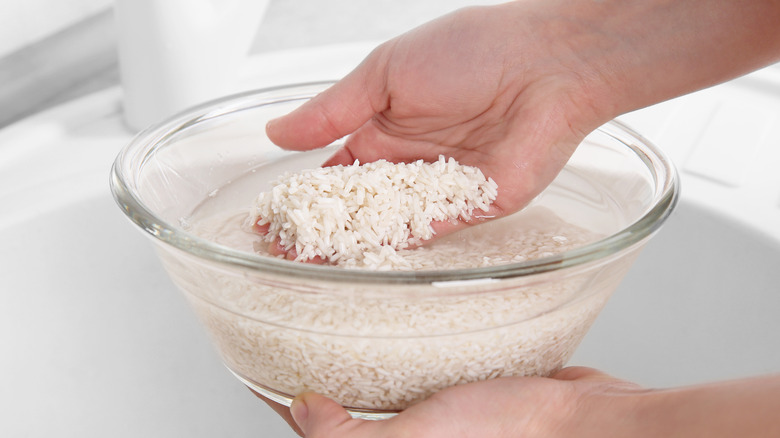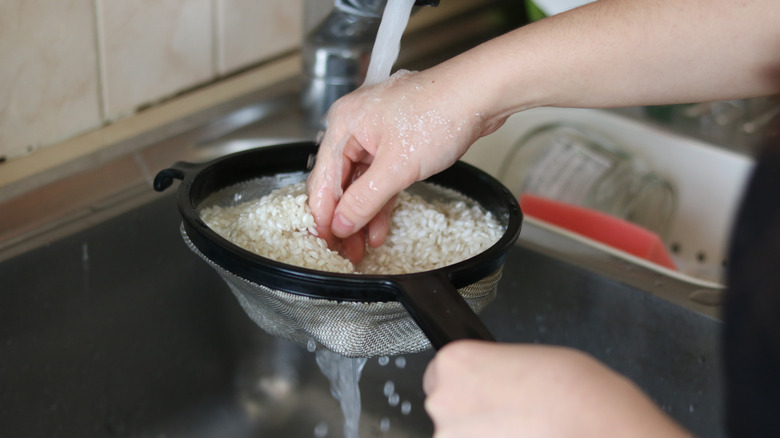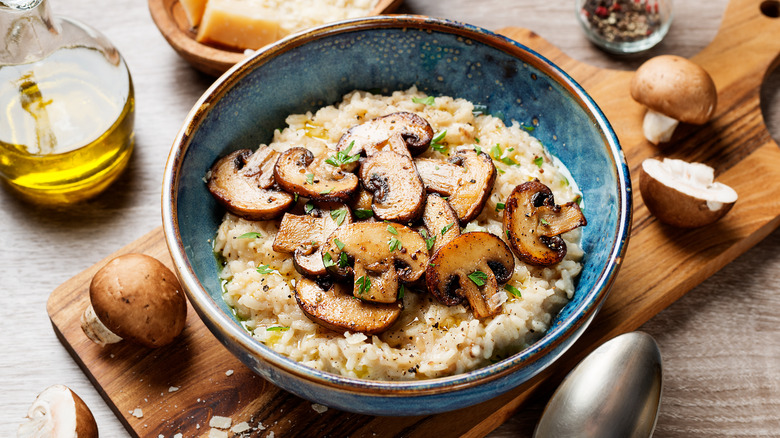Why Rinsing Rice Is More Crucial Than You Might Think
We've all been there before when prepping a last-minute dinner. Looking at the long list of steps in your recipe, you try to figure out which you can skip to make the meal come together as fast as possible.
Beyond being easier, some shortcuts are actually the better choice — like grating frozen butter for baked goods or using a microplane on garlic instead of finely mincing it by hand when whipping up a vinaigrette.
Of course, there are also some timesavers you might want to think twice about, like defrosting chicken in hot water, which the USDA reports can encourage dangerous bacterial growth. And while Bon Appétit explains that you can skip rinsing most types of pasta, the same is not true when cooking rice. Though it may be tempting to skip that pre-cooking rinse, there is a real reason you absolutely should take that extra minute to give your grains a bath.
Rinse rice to make a fluffy bowl
We often judge rice by how light and fluffy it is, but the ingredient doesn't inherently turn out that way. It can easily become gummy and clumped together if you skip one crucial step: rinsing the rice.
So why does the seemingly small action make such a difference? Over at Food52, cookbook author Nik Sharma explains rice tends to travel quite far from paddy to your local grocery store, and during that lengthy trip, the grains rub against each other until starchy dust coats each one. Removing that starch is key to making sure your rice grains do not clump together when cooking, otherwise, it can congeal and leave your rice with a sticky texture.
To rinse your rice, you'll want to use a strainer, bowl, or sieve and rinse the grains under cold water until the water runs clear; Martha Stewart says whole-grain rice varieties take about 30 seconds and white rice generally takes one to two minutes. If you're unsure if the water is clear or not, Cook's Illustrated recommends placing a bowl under your strainer which will make it easier to judge.
Can you ever skip the step?
Experts are split on if you should rinse rice for dishes like risotto or rice pudding that are meant to have grains stuck together. MyRecipes and Food & Wine both give a definitive no, but Nik Sharma says it's still important to do a quick rinse in these situations, as the grains could come with dirt, chemicals, and bugs (via Food52). The author also notes that studies have shown rinsing may reduce potentially dangerous heavy metals present in the rice, like arsenic or lead. (While that may sound frightening, The Washington Post reports the arsenic in rice isn't really something adults need to be concerned with unless they are pregnant.)
If you're really set on skipping the pre-cooking rinse for your dinner, America's Test Kitchen states that there's no need to rinse brown rice, as its exterior bran layer is intact, which prevents starch from accumulating. This does, however, come with a catch: Brown rice takes longer to cook than white rice, so you'll actually save time by just giving your grains a quick wash (via Simply Recipes). Like other types of rice, brown rice also contains arsenic, so if that is something you're trying to avoid you'll still want to rinse your brown rice for this reason.


